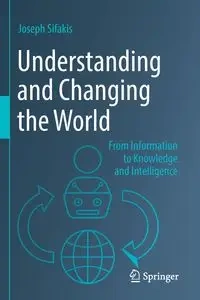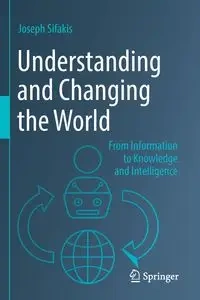Understanding and Changing the World - Joseph Sifakis
- From Information to Knowledge and Intelligence
This book discusses the importance of knowledge as an intangible asset, separate from physical entities, that can enable us to understand and/or change the world. It provides a thorough treatment of knowledge, one that is free of ideological and philosophical preconceptions, and which relies exclusively on concepts and principles from the theory of computing and logic. It starts with an introduction to knowledge as truthful and useful information, and its development and management by computers and humans. It analyses the relationship between computational processes and physical phenomena, as well as the processes of knowledge production and application by humans and computers.
In turn, the book presents autonomous systems that are called upon to replace humans in complex operations as a step toward strong AI, and discusses the risks - real or hypothetical - of the careless use of these systems. It compares human and machine intelligence, attempting to answer the question of whether and to what extent computers, as they stand today, can approach human-level situation awareness and decision-making.
Lastly, the book explains the functioning of individual consciousness as an autonomous system that manages short- and long-term objectives on the basis of value criteria and accumulated knowledge. It discusses how individual values are shaped in society and the role of institutions in fostering and maintaining a common set of values for strengthening social cohesion.
The book differs from books on the philosophy of science in many respects, e.g. by considering knowledge in its multiple facets and degrees of validity and truthfulness. It follows the dualist tradition of logicians, emphasizing the importance of logic and language and considering an abstract concept of information very different from the one used in the physical sciences. From this perspective, it levels some hopefully well-founded criticism at approaches that consider information and knowledge as nothing more than the emergent properties of physical phenomena.
The book strikes a balance between popular books that sidestep fundamental issues and focus on sensationalism, and scientific or philosophical books that are not accessible to non-experts. As such, it is intended for a broad audience interested in the role of knowledge as a driver for change and development, and as a common good whose production and application could shape the future of humanity.
EAN: 9789811919985




This book discusses the importance of knowledge as an intangible asset, separate from physical entities, that can enable us to understand and/or change the world. It provides a thorough treatment of knowledge, one that is free of ideological and philosophical preconceptions, and which relies exclusively on concepts and principles from the theory of computing and logic. It starts with an introduction to knowledge as truthful and useful information, and its development and management by computers and humans. It analyses the relationship between computational processes and physical phenomena, as well as the processes of knowledge production and application by humans and computers.
In turn, the book presents autonomous systems that are called upon to replace humans in complex operations as a step toward strong AI, and discusses the risks - real or hypothetical - of the careless use of these systems. It compares human and machine intelligence, attempting to answer the question of whether and to what extent computers, as they stand today, can approach human-level situation awareness and decision-making.
Lastly, the book explains the functioning of individual consciousness as an autonomous system that manages short- and long-term objectives on the basis of value criteria and accumulated knowledge. It discusses how individual values are shaped in society and the role of institutions in fostering and maintaining a common set of values for strengthening social cohesion.
The book differs from books on the philosophy of science in many respects, e.g. by considering knowledge in its multiple facets and degrees of validity and truthfulness. It follows the dualist tradition of logicians, emphasizing the importance of logic and language and considering an abstract concept of information very different from the one used in the physical sciences. From this perspective, it levels some hopefully well-founded criticism at approaches that consider information and knowledge as nothing more than the emergent properties of physical phenomena.
The book strikes a balance between popular books that sidestep fundamental issues and focus on sensationalism, and scientific or philosophical books that are not accessible to non-experts. As such, it is intended for a broad audience interested in the role of knowledge as a driver for change and development, and as a common good whose production and application could shape the future of humanity.
EAN: 9789811919985

